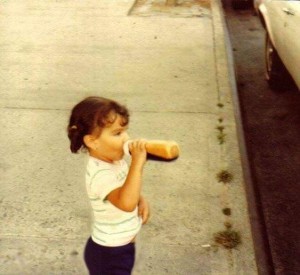On my way to work today scrolling down my Twitter feed on the subway platform, I saw that it was World Health Day and to my delight this year’s focus is “Beat #Diabetes”!
World Health Day 2016: #Beat diabetes

This is a topic close to my heart (and my non-working pancreas) and the main reason why food became my passion. Twenty years ago, almost to the exact day, I was diagnosed with Type-1 Diabetes AKA Juvenile, child-onset or insulin-dependent diabetes. On April 16, 1996, my world changed forever and so would my relationship with food.
Like many Type 1’s, I get frustrated at the ignorance that surrounds this disease, as most of the hype focuses on Type 2 Diabetes. My Diabetes, which accounts for approximately 1.25 million American children and adults, isn’t caused by poor lifestyle choices, lack of physical activity or an unhealthy diet. The causes for Type 1 are actually still unknown but over the years there have been many theories as to how this invisible killer comes about: bacteria and/or virus, medicinal drugs, chemical irritants and/or environmental irritants. Even still, there is much ignorance, public misconception and misperception that looms around Diabetes. Media outlets all over the world picked up on this health story, highlighting the plenty misconceptions and feeding the stigma. These messages get muddled and broken down into clickbait headlines and many times this hurts communities more than it educates. 
What Exactly is Type 1 Diabetes?: it’s an autoimmune disease characterized by the destruction of insulin producing cells in the pancreas and it requires a daily administration of insulin. It has no cure and injecting insulin is probably the easiest part of the disease. Like many other autoimmune diseases, like Celiac, Lupus and Autism, food plays a huge role in disease management.
Diabetes & Food: All people with Diabetes, regardless of type, know that in order to have tight control of their blood sugars, they must understand their bodies and must understand food and the role it plays in their daily lives. This disease is by no way easy. It is second full-time job and one that is ALWAYS hiring. 
For me, Diabetes acutely impacted my predisposition about food, something that plays a constant and important role in my culture. My entire family had to re-learn how to eat, what to eat, when to eat, and where to eat. While food did not cause my diabetes, it has a direct impact on how well I manage the disease. Food was (is) not my enemy but being that I must eat to live, it was imperative for me to learn about this disease, how to inject myself 6 to 8 times a day, how to monitor my blood sugars and how to calculate my dosages. Carb counting is essential in order to prevent hyperglycemia (high blood sugar), and hypoglycemia (low blood sugar), both daily experiences of people with Diabetes, but if we take too much insulin, we can go into Diabetic coma. If we don’t take enough, we run the risk of going into Ketoacidosis.
“WHO projects that by 2030, diabetes will be the seventh leading cause of death in the world.”
 What is insulin?: it’s a hormone made by the pancreas that helps the body store and use glucose and converts food into energy. It is responsible for delivering the glucose from the bloodstream into muscle, fat, liver, and our cells so that the body can use food for fuel.
What is insulin?: it’s a hormone made by the pancreas that helps the body store and use glucose and converts food into energy. It is responsible for delivering the glucose from the bloodstream into muscle, fat, liver, and our cells so that the body can use food for fuel.
Because I decided at a young age that my chronic ilness was not going to get in the way of my love for food,  I spent years putting effort into learning. This includes speaking at support groups, going to culinary school to learn about ingredients and health-supportive cooking, traveling to study and discover how people ate in different parts of the world and reading a ton of books on food, disease, health and culture. There’s an unbreakable connection that food and drink fosters between people, as well as a strong link that disease and illness creates, too — and that’s regardless of demographics.
I spent years putting effort into learning. This includes speaking at support groups, going to culinary school to learn about ingredients and health-supportive cooking, traveling to study and discover how people ate in different parts of the world and reading a ton of books on food, disease, health and culture. There’s an unbreakable connection that food and drink fosters between people, as well as a strong link that disease and illness creates, too — and that’s regardless of demographics.
The Goals of the World Health Day 2016 Campaign are to:
1. Scale up prevention and increase awareness about the rise in diabetes, and its staggering burden and consequences, in particular in low-and middle-income countries.
2. Strengthen care and trigger a set of specific, effective and affordable actions to tackle diabetes. These will include steps to prevent diabetes and diagnose, enhance surveillance, and treat and care for people with diabetes.
3. Launch the first Global report on diabetes, which will describe the burden and consequences of diabetes and advocate for stronger health systems to ensure improved surveillance, enhanced prevention, and more effective management of diabetes.

Today, I have the same love for food and drink as I did as a child, but just with anything else AWARENESS and EDUCATION have been key. What I hope is that, after today, people everywhere will start to learn more about Diabetes, and the core differences between Type 1 and Type 2, two different diseases that continue to kill millions around the globe. Hopefully one day there will be a cure for all Diabetes.
To learn more about Diabetes, see links below:
Diabetes Fact Sheet
American Diabetes Association
A Global Alarm About Diabetes — And Don’t Blame It All On Fast Food
